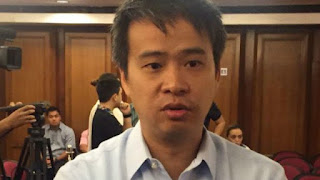Philippines Posts Strongest Economic Growth in Asia at 7.1%
The Philippine economy grew at its fastest pace in three years last quarter, underscoring the nation’s resilience to global risks as investment surged and consumers spent more. Stocks gained.
Key Points
Gross domestic product increased 7.1 percent from a year earlier, the Philippine Statistics Authority said in Manila Thursday. The median estimate of 15 economists surveyed by Bloomberg was 6.7 percent
Compared with the previous quarter, GDP rose 1.2 percent, in line with economists’ estimates
Undeterred by risks such as Donald Trump’s protectionist ambitions and President Rodrigo Duterte’s rants against the U.S., the Philippine economy is set to expand more than 6 percent until 2018 to rank among the fastest-growing in the world, according to economists surveyed by Bloomberg. Last quarter’s growth exceeded China’s 6.7 percent and Vietnam’s 6.4 percent in the same period. India, which posted growth of 7.1 percent in the second quarter, is yet to publish GDP data for the three months through September.
Gifted with a young population and backed by $50 billion of revenue from remittances and outsourcing, the Philippines is getting an additional boost from Duterte’s $160 billion-infrastructure plan aimed at creating jobs. Projects include at least $1 billion of contracts to build an airport and a railway to transform a former U.S. military base into a commercial hub.
Markets
Philippine stocks rose a second day, climbing as much as 2.2 percent. They were up 1.1 percent as of 11:01 a.m. in Manila.
The peso was little changed at 49.32 per dollar.
Analyst Takeaways
“Philippines will remain an outperformer in the region,” said Rahul Bajoria, a senior economist at Barclays Plc in Singapore. “It is domestically driven, with consumption holding up quite well and the fiscal spending being planned. The global risks we’re seeing including to trade won’t fundamentally alter its prospects.”
“In the short term at least, we expect the economy will continue growing at a decent pace,” Gareth Leather, senior Asia economist at Capital Economics Ltd. in London, said in a note. “The foundations are in place for growth to remain strong, but recent political events, both in the US and domestically, have made the outlook much less certain.”
“Putting money on infrastructure-related stocks is the smart bet and it’s exactly what I am doing,” said John Padilla, who helps manage about $9.1 billion at Metropolitan Bank & Trust Co., the Philippines third-largest money manager. “This growth poses now more challenge for President Duterte to keep the pace. It supports the view that Philippines needs infrastructure to sustain this growth."
Duterte gov’t lauded; early economic momentum cited
Construction and infrastructure are among the sectors that help the country register a 7.1 percent gross domestic product (GDP) in the July to September period (CDN FILE PHOTO).
Business leaders in Cebu lauded the present administration for the 7.1-percent growth of the Philippine economy during the first three months of President Rodrigo Duterte in office.
However, some said this could also be owed to the momentum gained as early as the start of the year, where the economy expanded by 6.9 percent in the first quarter.
“This is an excellent result for the Philippines and definitely the current administration deserves some credit, although I suspect that most of this growth was pushed by the momentum of the Philippine economy,” Cebu Business Club president Gordon Alan Joseph told Cebu Daily News in a text message.
For Joseph, it takes more than three months for real reform to take place, although he admitted that the country is on the right track given the soundness of President Duterte’s socioeconomic agenda.
According to the Philippine Statistics Authority (PSA) on Thursday, the country’s Gross Domestic Product (GDP) growth at 7.1 percent during July to September period was faster than the 7-percent expansion in the second quarter this year and the 6.2-percent growth during the third quarter of 2015.
Economic Planning Undersecretary Rosemarie Edillon, in a statement, said this exceeded the consensus forecast of 6.8 percent and was even faster than China’s 6.7 percent, beating other major emerging economies for the same period as well.
This development came at the wake of unease among some foreign investors over his controversial crackdown on drugs and proposed changes in foreign policy.
Edillon cited strong investment growth, particularly in construction and infrastructure, along with upbeat consumer spending, encouraged by low inflation and low interest rates, as among the major drivers of this expansion.
Exports up
Exports finally picked up to grow at 7.8 percent, after seeing a decline in demand within the global market for 17 straight months.
Federico Escalona, executive director of the Philippine Exporters Confederation (Philexport) in Cebu, said exports usually increase toward the end of the year since this is usually when overseas workers and immigrants send remittances back to the country.
Among the gainers in the export sector are electronics, logging a 66-percent growth during the period in review, as well as metals and clothing. Losers, meanwhile, included food crop, transport machinery, and furniture.
Escalona said the 7.1-percent GDP growth is impressive, but Duterte needs to be in office for at least 12 months before the effects of his pronouncements can be felt.
Nowhere to go but up
For Cebuano economist Ferry Fajardo, there’s nowhere the Philippines can go but up at this point.
“It’s really the momentum,” he said, explaining that the country’s economy will grow even more until it reaches a certain point or a “wall” which he said isn’t present at the moment.
He added that many of the economic policies put in place during past administrations are still being implemented by the present administration.
Fajardo said it’s easier for the Philippines to grow at such a fast rate, especially when it started with a low base.
China, for example, grew 8 to 10 percent in the first few years after it opened its economy to the world some 30 years ago.
He said many were worried about the changes in policy especially with the rhetoric of the President, but it was just that — rhetoric.
However, he cautioned that the government should be careful in making statements that will affect the perception of foreign investors as investments are highly dependent on perception.
He said investors need to know that two or three years from now, something good will come out of their investments in the Philippines today.
Cebu Chamber of Commerce and Industry (CCCI) president Melanie Ng, for her part, said this reinforces the fact that the Philippines is indeed the fastest-growing economy in Asia.
“This latest result further supports the attractiveness of our country as an investment economic destination especially with the investment pledges received from China, Japan and Malaysia recently,” she said.
Ng added that the growth in export will greatly impact the overall economic supply chain in the country and will benefit the micro, small, and medium-scale enterprises (MSMEs) in the supply chain as well.
Glenn Soco, Mandaue Chamber of Commerce and Industry president, agreed this showed that the Philippines is on the right track.
“Our economy would only get better as the present administration’s economic agenda is just starting to kick-off,” he said.
The government targets a conservative 6-7 percent GDP growth in 2016 and will need to expand by 6.9 percent in the last three months of the year to hit the top end of its target.
Other Details
Household spending, which makes up about 70 percent of GDP, rose 7.3 percent from a year earlier
Government spending gained 3.1 percent
Investment surged 20 percent
With reports from : Bloomberg And Cebu Daily News





























